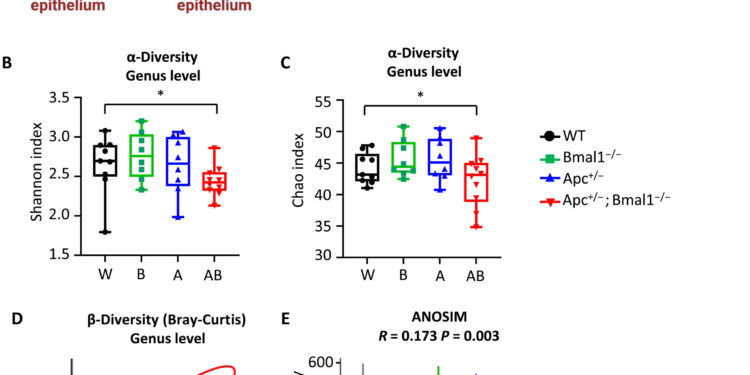Clock disruptions and cancer alter microbial structure. Credit: Scientific advances (2024). DOI: 10.1126/sciadv.ado1458
Research from the University of California, Irvine, has revealed how disruption of the circadian clock, the body’s internal biological pacemaker running 24 hours a day, can accelerate the progression of colorectal cancer by affecting the gut microbiome and function of the body. intestinal barrier. This discovery offers new avenues for prevention and treatment strategies.
The study, published online today in the journal Scientific advancesprovides a more comprehensive understanding of how significant changes occur in the function and composition of the gut microbiome when the circadian clock is disrupted in the presence of colorectal cancer.
“There is an alarming increase in early-onset colorectal cancer among adults under the age of 50,” said corresponding author Selma Masri, associate professor of biological chemistry. “Circadian misalignment due to prolonged exposure to light, late-night eating and other environmental factors could (be) behind these cases. Our study suggests that clock disruptions , particularly due to lifestyle choices, can play an important role in gut health and, therefore, cancer risk.
Previous research has shown that disruptions to the circadian clock can influence the progression of colorectal cancer, but so far, how the biological clock and the impact of cancer on the gut microbiome were unclear. Using mouse models of colorectal cancer, the team found that when the circadian clock is disrupted, the diversity and abundance of gut bacteria changes, which is further exacerbated by cancer development.
The researchers also identified notable alterations in microbial pathways involved in the metabolism of nucleic acids, amino acids and carbohydrates. These functional changes were linked to reduced levels of intestinal mucus, which normally protects the intestinal lining from harmful bacteria, suggesting that the circadian clock is crucial for maintaining barrier integrity. Increased permeability of the intestinal lining allows toxins and bacteria to enter the bloodstream, potentially accelerating the progression of cancer.
“While these results are important, there is still work to be done,” Masri said. “In particular, we now want to know whether changes in the timing and abundance of certain gut bacteria could directly lead to the development of colorectal cancer over time. Long-term studies will be essential to determine whether circadian misalignment causes the cancer and how we might prevent it in the future. Deeper knowledge of how the body’s internal clock shapes the gut’s ecosystem could pave the way for treatments that not only fight cancer, but also improve overall gut health.
The study was led by Rachel Fellows, a postdoctoral fellow in biological chemistry. Other team members included assistant professors Marcus M. Seldin and Nicholas R. Pannunzio; postdoctoral fellow Sung Kook Chun; graduate students Alisa L. Mahieu, Bridget Fortin and Wei A. Song; and associate specialist Natalie Larson, all in the School of Medicine’s Department of Biological Chemistry.
More information:
Rachel C. Fellows et al, Disruption of the gut clock leads to dysbiosis and impaired barrier function in colorectal cancer, Scientific advances (2024). DOI: 10.1126/sciadv.ado1458
Provided by University of California, Irvine
Quote: Circadian disruption, changes in the intestinal microbiome linked to the progression of colorectal cancer (September 28, 2024) retrieved September 28, 2024 from
This document is subject to copyright. Except for fair use for private study or research purposes, no part may be reproduced without written permission. The content is provided for informational purposes only.



